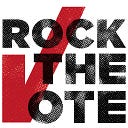The Push and Pull for Voting Rights
By Carolyn DeWitt, President of Rock the Vote
How many votes does it take to swing a presidential election? Some elections have been decided by a handful of votes in a single state. In 2008 and 2012, Millennial voters in battleground states, like Florida and Ohio, were a decisive voice, electing and reelecting our nation’s first African-American president. This year, Millennials will be the largest generational voting bloc, and again, we have the opportunity to decide the next president.
Today, as we celebrate the anniversary of the Voting Rights Act of 1965, I think of Congressman John Lewis, who as a young activist fought for its passage in Selma, Alabama, 51 years ago. Last year, he reminded us, “There’s still work left to be done. Get out there and push and pull until we redeem the soul of America.”
Perhaps fearing the strength of a young, diverse electorate, state legislatures across the country have worked to roll back voting rights in recent years. Following the U.S. Supreme Court’s disastrous 2013 ruling in Shelby County v. Holder, which gutted the Voting Rights Act, a number of states with histories of racially discriminatory voting laws were no longer subject to oversight. Several of these states moved quickly, passing and implementing new laws that otherwise would have been prevented. Texas and North Carolina, which had both fallen under this review process, passed and implemented some of the country’s most restrictive policies.
Beyond Texas and North Carolina, states across the country stripped away voting rights under the guise of combatting voter fraud. Let me be clear: there is no real evidence that voter fraud is a problem in our country. Instead, these unnecessary restrictions threaten the basic values of our democracy: the notion that we are all better off when more of us — not less — have a chance to determine our future.
Finally, and just in time, federal courts have begun overturning these restrictive laws, finding them to be racially discriminatory by silencing minority voters. Just a few months before a national election, five different courts in five different states ruled against voter ID and proof-of-citizenship laws. Make no mistake, these rulings are wins for diversity and inclusion. But the fact we still have to fight these battles underscores the continued importance of the Voting Rights Act.
Millennials are the largest and most diverse generation in American history. We are gay and straight, transgender and cisgender. We are black, brown, white and all of the above. For some of us, we live in the same town where our grandparents were raised, and for others we are the first generation born in this country. Some of us are struggling to get by; others are redefining success and already forging a path toward it. We are passionate about the issues that impact our diverse lives — from gun violence to crushing student debt, defending access to exercise our reproductive rights to fixing our broken criminal justice system. We know that these issues shape not just our country, but our entire world.
Young people from Philadelphia to Fresno and Detroit to Austin are joining together to push boundaries and to fight for an inclusive future that works for all. And when we come together — across race, gender, family background, income, sexual orientation, gender identity and ability — we have the power to change society for the better.
So when the powerful try to mute our voices through restrictions on voting rights, we will — and we must — fight back. We have to speak truth to power. We have to push for a future that is just, where every person’s voice is part of the conversation and where all can live with dignity, freedom and hope.
Generations are defined not only by their values, but by how hard they fight to protect and advance those values — for themselves and for generations to follow. Every day, I am inspired by the young people I meet who are pushing against the powers that be and pulling themselves and their communities toward a better future. To celebrate the anniversary of the Voting Rights Act, and to honor those who fought for it, we must acknowledge that this fight is not over and we must continue to use our votes to build a system that reflects our values.
We must choose leaders who will defend our right to vote — who will protect our role in shaping our nation’s future. This November, we will elect new state legislators and governors, who determine our voting laws. And we will choose the next president and members of Congress who will restore have the power to restore the Voting Rights Act and shape the Supreme Court for a generation. Let’s get out there and vote to redeem the soul of our country.
